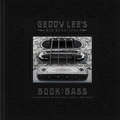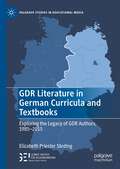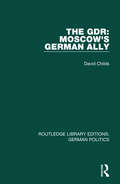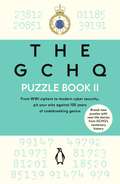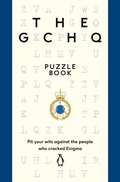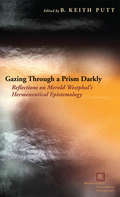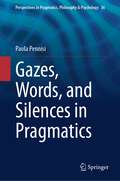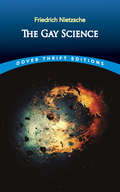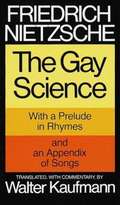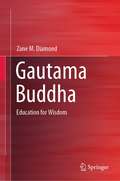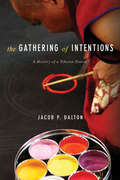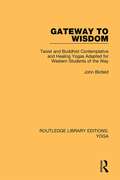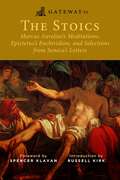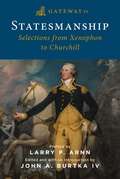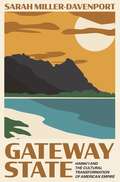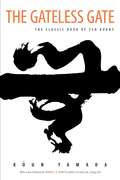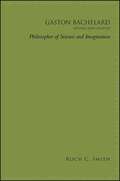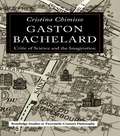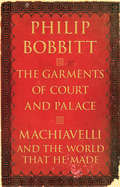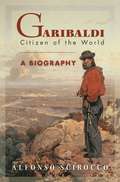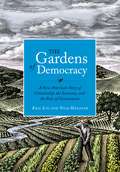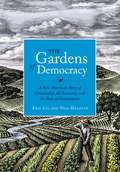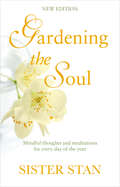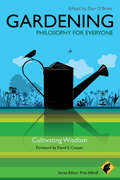- Table View
- List View
Geddy Lee's Big Beautiful Book of Bass
by Geddy LeeRock ‘n’ Roll Hall of Famer and Rush bassist Geddy Lee celebrates rock music’s thunderous, rumbly bottom end—the bass—in this unique, lavishly illustrated, full-color compendium showcasing over two hundred rare, iconic, beautiful, and sometimes eccentric bass guitars from his extensive collection. <P><P>In this luxurious keepsake volume, Geddy Lee chronicles the fascinating history of one of rock music’s foundation instruments, the bass guitar. Written with arts journalist Daniel Richler, gorgeously photographed by Richard Sibbals, and with insight from Geddy’s trusted bass tech and curator, John "Skully" McIntosh, Geddy Lee’s Big Beautiful Book of Bass profiles over two hundred classic basses from Geddy’s extensive collection. <P><P>The book combines knowledge and observations gleaned from Geddy’s long, successful career with new and behind-the-scenes photos, ranging from his earliest days to Rush’s sold-out 40th anniversary tour in 2015, plus personal interviews with some of the world’s top bassists and collectors. <P><P>A musician and guitar freak, Geddy has acquired the magnificent bass models that have been the backbone of the world’s greatest popular music, from greats such as Paul McCartney, John Entwistle, and Jack Bruce. <P><P>The book features vintage basses from 1950 through the mid-1970s—the golden age of guitar making. <P><P>Suffused with Geddy’s intelligence, taste, and disarming wit, Geddy Lee’s Big Beautiful Book of Bass is also an entertaining look at a legend’s career on stage, in the studio, and at home. Geddy shares his views of the role of the bass guitar in his life and in the lives of the great players who’ve influenced him, revealing his passions and motivations, and ultimately broadening fans’ appreciation of his beloved instrument.
GDR Literature in German Curricula and Textbooks: Exploring the Legacy of GDR Authors, 1985-2015 (Palgrave Studies in Educational Media)
by Elizabeth Priester StedingThis book analyzes the changing portrayal of GDR literature in German Gymnasium textbooks 1985-2015. Addressing the need for textbook research to broaden its focus from GDR history to GDR literature, the author presents case studies of well-known GDR authors (Bertolt Brecht, Johannes R. Becher, Anna Seghers, Wolf Biermann, and Christa Wolf), each examining a particular aspect of the societal discourse about GDR literature and the tension between (literary) text and (historical) context. Taken together, the case studies reveal the frequently underestimated power of ideology in literature textbooks. They also show how attempts to package these authors into simplified categories ultimately reveal the profound complexities of the GDR literary legacy. By examining the clear tension between literature and politics in textbooks and curricula, the author demonstrates how ideological messages are transmitted in all textbooks, as well as the importance of attending to overt and covert ideology.
The GDR: Moscow's German Ally (Routledge Library Editions: German Politics)
by David ChildsWidely praised in its first edition, the second edition of The GDR was updated to cover events through the spring of 1988, examining in particular the impact of new leadership in both Bonn and Moscow and of the changing world economy on the prospects of the GDR.
The GCHQ Puzzle Book II
by GCHQTrain your brain with these fiendishly difficult puzzles, the perfect companion for anyone wanting to keep their mind busy'Fiendishly tricky' Daily MailWith their first bestselling book, The GCHQ Puzzle Book, the UK's intelligence and security experts tested us with puzzles, codes and real-life entrance tests from their archives.Now, they are back with a NEW collection of head-scratching, mind-boggling and brain-bending puzzles that will leave you pondering for hours.For those who often found themselves stumped with the first book, The GCHQ Puzzle Book 2 offers even more starter puzzles to get those brains warmed up. Puzzle aficionados needn't worry though, as there is also an 'Even Harder' section to test everyone to their limits . . .Not only that, but in celebration of GCHQ's centenary, the puzzles in this new book sit alongside stories, facts and photos from the organisation's first 100 years at the heart of the nation's security. From the Government Code & Cipher School, to Bletchley Park, through to protecting against cyberattacks, the security of our country is in the hands of GCHQ. With this book, you get exclusive snapshots into the organisation that keeps us all safe.Train your brain to compete with the smartest in the country with this stimulating book of puzzles. If you haven't yet tested yourself with the first instalment of The GCHQ Puzzle Book, check it out now!'This is the perfect gift to fuel his ludicrous presumption that he could have definitely been a spy - even better if he's already dog-eared the first version' Huffington Post
The GCHQ Puzzle Book: Perfect for anyone who likes a good headscratcher
by GCHQSharpen your mind to beat the smartest brains in Britain with the original official GCHQ puzzle bookWould GCHQ recruit you? Pit your wits against the people who cracked Enigma in the official puzzle book from Britain's top secret intelligence and security organisationOver the years, their codebreakers have helped keep our country safe, from the Bletchley Park breakthroughs of WWII to the modern-day threat of cyber attack. So it comes as no surprise that, even in their time off, the staff at GCHQ love a good puzzle.Whether they're recruiting new staff or challenging each other to the toughest Christmas quizzes and treasure hunts imaginable, puzzles are at the heart of what GCHQ does. Now they're opening up their archives of decades' worth of codes, puzzles and challenges for everyone to try.In this book you will find:- Tips on how to get into the mindset of a codebreaker- Puzzles ranging in difficulty from easy to brain-bending- A competition section where we search for Britain's smartest puzzlerWith hundreds of stimulating puzzles, The GCHQ Puzzle Book is the perfect companion and will keep you occupied as you attempt to beat the smartest brains in Britain.GOOD LUCK!'Fiendish . . . as frustrating, divisive and annoying as it is deeply fulfilling' Guardian'Ideal for the crossword enthusiast' Daily TelegraphLooking for more ways to test yourself? The GCHQ Puzzle Book 2, a new collection of head-scratching, mind-boggling and brain-bending puzzles is out now!
Gazing Through a Prism Darkly: Reflections on Merold Westphal's Hermeneutical Epistemology
by B. Keith PuttMerold Westphal has been in the foremost ranks of philosophers who proclaim a new postsecular philosophy. By articulating an epistemology sensitive to the realities of cognitive finitude and moral weakness, he defends a wisdom that begins in both humility and commitment, one that always confesses that human beings can encounter meaning and truth only as human beings, never as gods. The present volume focuses on this wisdom of humility that characterizes Westphal's thought and explores how that wisdom, expressed through the redemptive dynamic of doubt, can contribute to developing a postsecular apologetic for faith. This book can function both as an accessible introduction to Westphal for those who have not read him extensively and also as an informed critical appreciation and extension of his work for those who are more experienced readers.
Gazes, Words, and Silences in Pragmatics (Perspectives in Pragmatics, Philosophy & Psychology #36)
by Paola PennisiThis book describes the role of eye contact in human communication by investigating the relationship between the eye gaze and the development of language and pragmatic skills. The author reveals that although the need for eye contact is an innate human characteristic, neurodevelopmental disorders can have adverse outcomes and delays in language and pragmatic skills. A comparative approach compares childhood disorders that affect pragmatics in animal species that are phylogenetically related to humans with those species that are not. This text appeals to students and researchers working in pragmatics and the philosophy of language.
The Gay Science: With A Prelude In Rhymes And An Appendix Of Songs (Dover Thrift Editions)
by Friedrich NietzscheAlthough dour in appearance and formidable in reputation, Friedrich Nietzsche was an ardent practitioner of the art of poetry—known in twelfth-century Provençal as "the gay science." This extensive collection of prose and verse offers a sophisticated treatment of the philosophical themes and views central to his thinking, as well as the ideas that proved most influential to later philosophers. Dating from the era when Nietzsche was at the peak of his intellectual powers, most of this book was written just before Thus Spoke Zarathustra, and the rest of it five years later, after Beyond Good and Evil. Zarathustra makes his first appearance in these pages, along with the author's well-known proclamation of the death of God. Readers will find this volume a wellspring for some of Nietzsche's most sustained and thought-provoking discussions of art and morality, knowledge and truth, the intellectual conscience, and the origin of logic, as well as the largest collection of Nietzsche's published poetry.
The Gay Science
by Friedrich Nietzsche Et. Al."God is dead. God remains dead. And we have killed him. . " This is the book in which Nietzsche put forth his boldest declaration. It is also his most personal, featuring some of the author's most important discussions of art, morality, knowledge, and, ultimately, truth.
The Gay Science: With a Prelude in Rhymes and an Appendix of Songs
by Friedrich Nietzsche Walter KaufmannNietzsche called The Gay Science "the most personal of all my books." It was here that he first proclaimed the death of God -- to which a large part of the book is devoted -- and his doctrine of the eternal recurrence.<P><P> Walter Kaufmann's commentary, with its many quotations from previously untranslated letters, brings to life Nietzsche as a human being and illuminates his philosophy. The book contains some of Nietzsche's most sustained discussions of art and morality, knowledge and truth, the intellectual conscience and the origin of logic.<P> Most of the book was written just before Thus Spoke Zarathustra, the last part five years later, after Beyond Good and Evil. We encounter Zarathustra in these pages as well as many of Nietzsche's most interesting philosophical ideas and the largest collection of his own poetry that he himself ever published.<P> Walter Kaufmann's English versions of Nietzsche represent one of the major translation enterprises of our time. He is the first philosopher to have translated Nietzsche's major works, and never before has a single translator given us so much of Nietzsche.
Gautama Buddha: Education for Wisdom
by Zane M. DiamondThis book examines some of the key elements of Buddhist education theory, in particular about educating for wisdom, the ultimate goal of Buddhist education. The teachings of Gautama Buddha have endured for thousands of years carried into the present era in schools, universities, temples, personal development courses, martial arts academies and an array of Buddhist philosophical societies across the globe. Philosophically, the ideas of the Buddha have held appeal across many cultures, but less is known about the underlying educational theories and practices that shape teaching and learning within Buddhist-inspired educational contexts. The chapters outline the development of the Buddha’s teachings, his broad approach to education and their relevance in the 21st century. Subsequently, the book reviews the history of the evolution of the various schools of Buddhist thought, their teaching and learning styles and the dissemination among Asia and later also the Western countries. The book discusses education theories and devices embedded within the Buddhist teachings, examining the works found in the Tipitaka, the Buddhist canon.
The Gathering of Intentions: A History of a Tibetan Tantra
by Jacob DaltonThe Gathering of Intentions reads a single Tibetan Buddhist ritual system through the movements of Tibetan history, revealing the social and material dimensions of an ostensibly timeless tradition. By subjecting tantric practice to historical analysis, the book offers new insight into the origins of Tibetan Buddhism, the formation of its canons, the emergence of new lineages and ceremonies, and modern efforts to revitalize the religion by returning to its mythic origins.The ritual system explored in this volume is based on the Gathering of Intentions Sutra, the fundamental "root tantra" of the Anuyoga class of teachings belonging to the Nyingma ("Ancient") school of Tibetan Buddhism. Proceeding chronologically from the ninth century to the present, each chapter features a Tibetan author negotiating a perceived gap between the original root text—the Gathering of Intentions—and the lived religious or political concerns of his day. These ongoing tensions underscore the significance of Tibet's elaborate esoteric ritual systems, which have persisted for centuries, evolving in response to historical conditions. Rather than overlook practice in favor of philosophical concerns, this volume prioritizes Tibetan Buddhism's ritual systems for a richer portrait of the tradition.
Gateway to Wisdom: Taoist and Buddhist Contemplative and Healing Yogas Adapted for Western Students of the Way (Routledge Library Editions: Yoga #1)
by John BlofeldThis book, first published in 1980, comprises separate sections on Taoist and Buddhist contemplative yogas, each divided into a theory part (summarising their fundamental principles and outlook) and a practice part (detailing their various practices).
Gateway to the Stoics: Marcus Aurelius's Meditations, Epictetus's Enchiridion, and Selections from Seneca's Letters
by Marcus Aurelius Epictetus SenecaThe one book you need to master stoic philosophy!This classic collection, newly revised and with a foreword by classicist Spencer Klavan, includes the famed original introduction by Russell Kirk, the full text of the Meditations of Marcus Aurelius, the complete Enchiridion of Epictetus, and key selections from Seneca and Hierocles of Alexandria in one compact volume.
Gateway to Statesmanship: Selections from Xenophon to Churchill
by IV John A. BurtkaThe study of statesmanship is not a subject for leaders in politics alone. It is the study of the whole human being in thought and action.The classics teach us of the difficult choices that must be made, an activity that guides lives and forms character. This collection of writings includes ancient, Medieval, Renaissance, and modern scholarship on statesmanship from Xenophon, Aristotle, Cicero, Augustine, Erasmus, Niccolo Machiavelli, George Washington, Theodore Roosevelt, Winston Churchill, and more, selected and with an introduction by the president of the Intercollegiate Studies Institute, John A. Burtka.
Gateway State: Hawai‘i and the Cultural Transformation of American Empire (Politics and Society in Modern America #134)
by Sarah Miller-DavenportHow Hawai'i became an emblem of multiculturalism during its journey to statehood in the mid-twentieth centuryGateway State explores the development of Hawai'i as a model for liberal multiculturalism and a tool of American global power in the era of decolonization. The establishment of Hawai'i statehood in 1959 was a watershed moment, not only in the ways Americans defined their nation’s role on the international stage but also in the ways they understood the problems of social difference at home. Hawai'i’s remarkable transition from territory to state heralded the emergence of postwar multiculturalism, which was a response both to independence movements abroad and to the limits of civil rights in the United States.Once a racially problematic overseas colony, by the 1960s, Hawai'i had come to symbolize John F. Kennedy’s New Frontier. This was a more inclusive idea of who counted as American at home and what areas of the world were considered to be within the U.S. sphere of influence. Statehood advocates argued that Hawai'i and its majority Asian population could serve as a bridge to Cold War Asia—and as a global showcase of American democracy and racial harmony. In the aftermath of statehood, business leaders and policymakers worked to institutionalize and sell this ideal by capitalizing on Hawai'i’s diversity. Asian Americans in Hawai'i never lost a perceived connection to Asia. Instead, their ethnic difference became a marketable resource to help other Americans navigate a decolonizing world.As excitement over statehood dimmed, the utopian vision of Hawai'i fell apart, revealing how racial inequality and U.S. imperialism continued to shape the fiftieth state—and igniting a backlash against the islands’ white-dominated institutions.
The Gateless Gate
by Ruben L. Habito Koun YamadaIn The Gateless Gate, one of modern Zen Buddhism's uniquely influential masters offers classic commentaries on the Mumonkan, one of Zen's greatest collections of teaching stories. This translation was compiled with the Western reader in mind, and includes Koan Yamada's clear and penetrating comments on each case. Yamada played a seminal role in bringing Zen Buddhism to the West from Japan, going on to be the head of the Sanbo Kyodan Zen Community. The Gateless Gate would be invaluable if only for the translation and commentary alone, yet it's loaded with extra material and is a fantastic resource to keep close by: An in-depth Introduction to the History of Zen Practice Lineage charts Japanese-to-Chinese and Chinese-to-Japanese conversion charts for personal names, place names, and names of writings Plus front- and back-matter from ancient and modern figures: Mumon, Shuan, Kubota Ji'un, Taizan Maezumi, Hugo Enomiya-Lasalle, and Yamada Roshi's son, Masamichi Yamada. A wonderful inspiration for the koan practitioner, and for those with a general interest in Zen Buddhism.
Gaston Bachelard, Revised and Updated: Philosopher of Science and Imagination (SUNY series in Contemporary French Thought)
by Roch C. SmithGaston Bachelard, one of twentieth-century France's most original thinkers, is known by English-language readers primarily as the author of The Poetics of Space and several other books on the imagination, but he made significant contributions to the philosophy and history of science. In this book, Roch C. Smith provides a comprehensive introduction to Bachelard's work, demonstrating how his writings on the literary imagination can be better understood in the context of his exploration of how knowledge works in science. After an overview of Bachelard's writings on the scientific mind as it was transformed by relativity, quantum physics, and modern chemistry, Smith examines Bachelard's works on the imagination in light of particular intellectual values Bachelard derived from science. His trajectory from science to a specifically literary imagination is traced by recognizing his concern with what science teaches about how we know, and his increasing preoccupation with questions of being when dealing with poetic imagery. Smith also explores the material and dynamic imagination associated with the four elements—fire, water, air, and earth—and the phenomenology of creative imagination in Bachelard's Poetics of Space, his Poetics of Reverie, and in the fragments of Poetics of Fire.
Gaston Bachelard: Critic of Science and the Imagination (Routledge Studies in Twentieth-Century Philosophy #Vol. 9)
by Cristina ChimissoIn this new study, Cristina Chimisso explores the work of the French Philosopher of Science, Gaston Bachelard (1884-1962) by situating it within French cultural life of the first half of the century. The book is introduced by a study - based on an analysis of portraits and literary representations - of how Bachelard's admirers transformed him into the mythical image of the Philosopher, the Patriarch and the 'Teacher of Happiness'. Such a projected image is contrasted with Bachelard's own conception of philosophy and his personal pedagogical and moral ideas.This pedagogical orientation is a major feature of Bachelard's texts, and one which deepens our understanding of the main philosophical arguments. The primary thesis of the book is based on the examination of the French educational system of the time and of French philosophy taught in schools and conceived by contemporary philosophers. This approach also helps to explain Bachelard's reception of psychoanalysis and his mastery of modern literature. Gaston Bachelard: Critic of Science and the Imagination thus allows for a new reading of Bachelard's body of work, whilst at the same time providing an insight into twentieth century French culture.
The Garments of Court and Palace: Machiavelli and the World That He Made (Books That Shook The World)
by Philip BobbittThe Prince, a political treatise by the Florentine public servant and political theorist Niccolo Machiavelli is widely regarded as the single most influential book on politics-and in particular on the the politics of power-ever written.In this groundbreaking book, Philip Bobbitt explores this often misunderstood work in the context of the time. He describes The Prince as one half of a masterpiece that, along with Machiavelli’s often neglected Discourses prophesies the end of the feudal era and describes the birth of the neoclassicalRenaissance State. Using both Renaissance examples and cases drawn from our current era, Bobbitt situates Machiavelli’s work as a turning point in our understanding of the relation between war and law as these create and maintain the State. This is a fascinating history and commentary by the man Henry Kissinger called "the outstanding political philosopher of our time."
Garibaldi: Citizen of the World: A Biography
by Alfonso SciroccoWhat adventure novelist could have invented the life of Giuseppe Garibaldi? The revolutionary, soldier, politician, and greatest figure in the fight for Italian unification, Garibaldi (1807-1882) brought off almost as many dramatic exploits in the Americas as he did in Europe, becoming an international freedom fighter, earning the title of the "hero of two worlds," and making himself perhaps the most famous and beloved man of his century. Alfonso Scirocco's Garibaldi is the most up-to-date, authoritative, comprehensive, and convincing biography of Garibaldi yet written. In vivid narrative style and unprecedented detail, and drawing on many new sources that shed fresh light on important events, Scirocco tells the full story of Garibaldi's fascinating public and private life, separating its myth-like reality from the outright myths that have surrounded Garibaldi since his own day. Scirocco tells how Garibaldi devoted his energies to the liberation of Italians and other oppressed peoples. Sentenced to death for his role in an abortive Genoese insurrection in 1834, Garibaldi fled to South America, where he joined two successive fights for independence--Rio Grande do Sul's against Brazil and Uruguay's against Argentina. He returned to Italy in 1848 to again fight for Italian independence, leading seven more campaigns, including the spectacular capture of Sicily. During the American Civil War, Abraham Lincoln even offered to make him a general in the Union army. Presenting Garibaldi as a complex and even contradictory figure, Scirocco shows us the pacifist who spent much of his life fighting; the nationalist who advocated European unification; the republican who served a king; and the man who, although compared by contemporaries to Aeneas and Odysseus, refused honors and wealth and spent his last years as a farmer.
The Gardens of Democracy: A New American Story of Citizenship, the Economy, and the Role of Government
by Eric Liu Nick HanauerAmerican democracy is informed by the 18th century's most cutting edge thinking on society, economics, and government. We've learned some things in the intervening 230 years about self interest, social behaviors, and how the world works. Now, authors Eric Liu and Nick Hanauer argue that some fundamental assumptions about citizenship, society, economics, and government need updating. For many years the dominant metaphor for understanding markets and government has been the machine. Liu and Hanauer view democracy not as a machine, but as a garden. A successful garden functions according to the inexorable tendencies of nature, but it also requires goals, regular tending, and an understanding of connected ecosystems. The latest ideas from science, social science, and economics--the cutting-edge ideas of today--generate these simple but revolutionary ideas:True self interest is mutual interest. (Society, it turns out, is an ecosystem that is healthiest when we take care of the whole.)Society becomes how we behave. (The model of citizenship depends on contagious behavior, hence positive behavior begets positive behavior.)We're all better off when we're all better off. (The economy is not an efficient machine. It's an effective garden that need tending. Adjust the definition of wealth to society creating solutions for all.)Government should be about the big what and the little how. (Government should establish the ideas and the goals, and then let the people find the solutions of how to make it happen.)Freedom is responsibility. (True freedom is not about living some variant of libertarianism but rather an active cooperation a part of a big whole society; freedom costs a little freedom.)The Gardens of Democracy is an optimistic, provocative, and timely summons to improve our role as citizens in a democratic society.
The Gardens of Democracy
by Nick Hanauer Eric LiuAmerican democracy is informed by the 18th century’s most cutting edge thinking on society, economics, and government. We’ve learned some things in the intervening 230 years about self interest, social behaviors, and how the world works. Now, authors Eric Liu and Nick Hanauer argue that some fundamental assumptions about citizenship, society, economics, and government need updating. For many years the dominant metaphor for understanding markets and government has been the machine. Liu and Hanauer view democracy not as a machine, but as a garden. A successful garden functions according to the inexorable tendencies of nature, but it also requires goals, regular tending, and an understanding of connected ecosystems. The latest ideas from science, social science, and economics—the cutting-edge ideas of today--generate these simple but revolutionary ideas: True self interest is mutual interest. (Society, it turns out, is an ecosystem that is healthiest when we take care of the whole.) Society becomes how we behave. (The model of citizenship depends on contagious behavior, hence positive behavior begets positive behavior.) We’re all better off when we’re all better off. (The economy is not an efficient machine. It’s an effective garden that need tending. Adjust the definition of wealth to society creating solutions for all.) Government should be about the big what and the little how. (Government should establish the ideas and the goals, and then let the people find the solutions of how to make it happen.) Freedom is responsibility. (True freedom is not about living some variant of libertarianism but rather an active cooperation a part of a big whole society; freedom costs a little freedom.) The Gardens of Democracy is an optimistic, provocative, and timely summons to improve our role as citizens in a democratic society.
Gardening The Soul: Mindful Thoughts and Meditations for Every Day of the Year
by Stanislaus KennedySister Stan, as she is affectionately known, was brought up on a farm in Dingle, County Kerry, one of the most beautiful parts of Ireland. It was there that she learnt to appreciate the earth, its stillness and its energy, its beauty and its bounty.In this hugely powerful and evocative book, Sister Stan looks to the earth that is so precious to our existence for inspiration throughout the year. Reflecting the garden's changing rhythms through the seasons, Gardening the Soul offers us a daily thought to keep us going as we face the challenges of modern life.All our moods are covered here... * in January, when there is silence in the garden, she looks at Solitude in our soul...* in March, with emergence in the garden, she offers Hope...* in August, when there is fullness and abundance everywhere, there is Blessing, and* in October, the time of harvest, there is Harmony Comforting and insightful, Gardening the Soul is an inspirational daybook of lessons gleaned from the wisdom of nature.
Gardening - Philosophy for Everyone
by Dan O'Brien Fritz Allhoff David E. CooperPhilosophy and gardens have been closely connected from the dawn of philosophy, with many drawing on their beauty and peace for philosophical inspiration. Gardens in turn give rise to a broad spectrum of philosophical questions. For the green-fingered thinker, this book reflects on a whole host of fascinating philosophical themes.Gardens and philosophy present a fascinating combination of subjects, historically important, and yet scarcely covered within the realms of philosophyContributions come from a wide range of authors, ranging from garden writers and gardeners, to those working in architecture, archaeology, archival studies, art history, anthropology, classics and philosophyEssays cover a broad spectrum of topics, ranging from Epicurus and Confucius to the aesthetics and philosophy of Central ParkOffers new perspectives on the experience and evaluation of gardens
